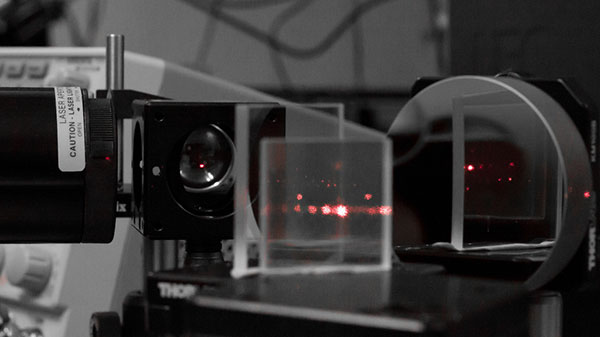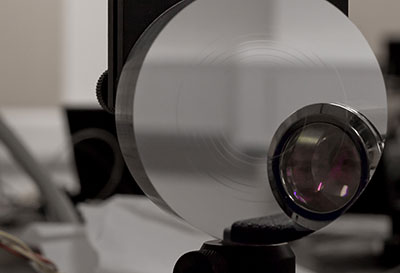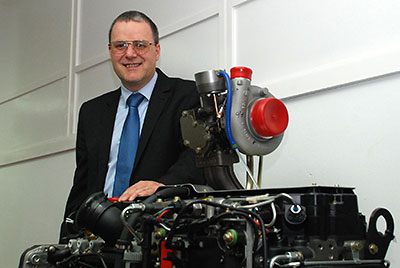Huddersfield’s research showcased at London’s Royal Institution
 A Dispersive White Light Interferometer is part of the equipment in the University's Centre for Precision Technologies (CPT) within the EPSRC Centre for Innovative Manufacturing in Advanced Metrology. The Centre will be featured in two case studies published online by the University Alliance.
A Dispersive White Light Interferometer is part of the equipment in the University's Centre for Precision Technologies (CPT) within the EPSRC Centre for Innovative Manufacturing in Advanced Metrology. The Centre will be featured in two case studies published online by the University Alliance.
Wed, 11 Mar 2015 11:03:00 GMT
The high profile event, organised by University Alliance, will welcome parliamentarians, businesses and researchers
 Excellent research carried out by the University of Huddersfield will be showcased in a new campaign launched by University Alliance.
Excellent research carried out by the University of Huddersfield will be showcased in a new campaign launched by University Alliance.
The resource – which can be found at www.unialliance.ac.uk/research – contains more than 60 impact case studies submitted by Alliance universities to the Research Excellence Framework (REF) exercise, completed last year.
This unique collection of impact case studies is being shown at a high-profile event attended by parliamentarians, businesses and researchers in the Royal Institution, London.
The studies illustrate the excellent research taking place at the universities, like Huddersfield, and its impact both here in the UK and around the world. Together with other Alliance universities, the University of Huddersfield is finding new ways, especially through collaborations with a wide range of local, national and global partners, to overcome socio-economic challenges: growing industries, improving healthcare, building sustainability and shaping society.
 Pictured left: A diamond turned ultra-precision surface undertaken in the University's EPSRC Centre for Innovative Manufacturing in Advanced Metrology.
Pictured left: A diamond turned ultra-precision surface undertaken in the University's EPSRC Centre for Innovative Manufacturing in Advanced Metrology.
“The University meets the needs of enterprise and industry not only by educating scientists, but by developing close research partnerships with innovative companies. Some of these are well-established global players, while others are ambitious local firms,” said the University’s Vice-Chancellor, Professor Bob Cryan, who was particularly pleased with Huddersfield’s growth in research power, which is calculated in terms of a university’s ‘breadth and depth of expertise’ across subject disciplines.
“I am delighted with the progress we have made in moving into the top half of the UK league table for research power,” said Professor Cryan. “Our aim has been to strengthen research activity right across the institution and this result demonstrates that our approach is working. Our aim over the next stage of our strategy is to build on the progress we have made and to further increase the quality, quantity and impact of the research we undertake.”
The event in London will also launch a new report concluding that collaboration and connectivity are essential for the UK to continue to lead the world in excellent research and innovation.
In response to this, the University is working collaboratively with members of the Alliance, to deliver a new doctoral training scheme called Doctoral Training Alliance. This scheme will be built around joint research strengths and embed close relationships with industry from design to delivery.
 Pictured right: Professor John Allport heads the University's Turbocharger Research Institute. The Institute's research will feature in the University Alliance's printed case studies booklet Real World Impact and in the published resource online.
Pictured right: Professor John Allport heads the University's Turbocharger Research Institute. The Institute's research will feature in the University Alliance's printed case studies booklet Real World Impact and in the published resource online.
The report, Evolve. Connect. Succeed. Funding a healthy research and innovation ecosystem, sets out for the first time what is needed to future proof our ecosystem, in particular the need for greater collaboration and connectivity.
“This is an important report, because a world-class research and innovation ecosystem is critical to the UK’s competitiveness and well-being,” said Maddalaine Ansell, Chief Executive of University Alliance. “The challenge is to ensure it remains excellent through responding and adapting to fast-paced change and increased competition. This requires not only continued investment in universities but also efficient and effective use of the existing excellence and capability in the system,” she concluded.
For the launch the University is being given the opportunity to showcase its excellent research by way of an interactive science fair in London’s Royal Institution. The case study on display will be Turbo-charging the engines of the future. This piece of research will also appear in the printed case studies booklet Real World Impact – a new kind of excellence in science and innovation.
In total, the University has three case studies published in the resource online. They are:







